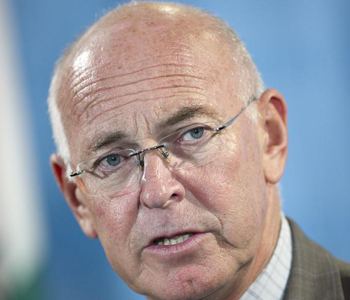By Nihal Zaroug.
Tripoli, 16 June:
Turky’s economy minister, Zafer Caglayan was in Tripoli on 10 June to meet with NTC Chairman Mustafa . . .[restrict]Abdul Jalil and to inaugurate a series of reconstruction projects undertaken by Turkish companies free of charge. This was Caglayan’s fourth visit to Libya, and he remarked that with each visit “Libya is getting better”.
Turkey was one of the first countries to re-open it embassy in Libya, and it has been amongst the most forward-leaning countries when it has come to pressing for business contracts in post-Qaddafi Libya. Turkey had one of the biggest presences at the Libya Build trade fair in April, with dozens of companies spread across two large pavilions.
Last Sunday, at the Nasr Forest conference hall located near the NTC headquarters, the Turkish delegation gave a presentation to NTC members on some of the recent work completed by Turkish companies. Caglayan highlighted the progress in re-establishing and maintaining police stations and health facilities and said these works were a testament to the good relationship between Libya and Turkey. He also said that Turkey had been with Libya since the beginning of the revolution and intended to stand with Libya in its economic and industrial development.
While speaking at the opening ceremony for the Tajoura Central School renovation project — a ceremony intended to symbolise all the projects undertaken by the Turkish companies — Caglayan said “the heart that beats in Tripoli is the same in Istanbul and Ankara.” The ceremony was attended by Deputy Prime Minister Mustafa Abu Shagour, who was thankful for Turkey’s role in the revolution, and Economy Minister Ahmed Al-Kochli.
Both economy ministers assured Turkish companies who had previously worked in Libya that they would be paid their outstanding dues and that Libya was eager for the return of Turkish investment.
It is said that Turkey’s keenness to be part of Libya’s future development has rubbed some local contractors the wrong way.
“We don’t have the money to do projects free of charge, the Turks are being clever and are ensuring their stake in future contracts by doing these projects for free,” protested one local contractor, adding that his previous experience working with Turkish contractors had been dfficult. He alleged that Turkish contractors had in the past, like many other foreign contractors, partnered with Libyan companies who had little construction experience to ensure control over projects. In addition, he felt foreign contractors were unwilling to hire local labourers, rather they brought labourers from their home countries. He acknowledged that Libya lacked skilled labourers, but claims he always tried to “hire locals before looking for foreigners…we have capable workers and some need on the job training. If we only bring outsiders to do Libyan jobs, what will Libyans do?”
The contractor’s claims are not unfounded. The government has not announced any future programmes to train Libyans as skilled labourers. With all the new infrastructure that Libya intends to build, one would presume that training Libyans would be a starting point in achieving a long-term solution. However, the government’s priority has been to source foreigners to come to Libya for work.
According to data collected in 2010, Libya is the only Arab country were male unemployment is higher than female unemployment. Unquestionably, Libyan men would rather work in construction than not work at all. [/restrict]







